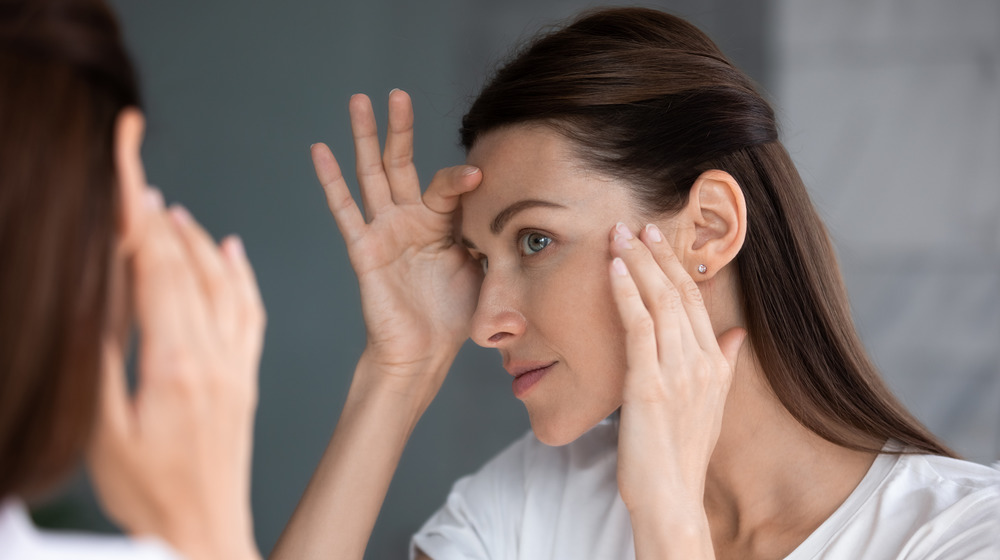Mistakes That Are Aging You In Unexpected Ways
While anti-aging serums and hyper-healthy green smoothies may feel like the best bets to beat back the clock (and they probably can't hurt), if you feel like you're dragging or looking or feeling older than you'd like, there may be some surprisingly simple reasons for this, and lifestyle changes that aren't terribly drastic might help you feel more youthful. Dr. Noelle Reid is an LA-based family medicine physician at Trinity Health and Wellness Medical Group who shares tips and tricks via her Instagram account, and she shared some of her best advice with The List.
Specifically, she says there are three things you may not be considering when it comes to maintaining your health and vitality, and addressing each one could have drastic and positive effects on your mental and physical well-being, as well as your youthful appearance. After all, age is more than wrinkles on your face or an aching back; it's also about cellular regeneration and neurological plasticity and health.
You may not be getting enough exercise
The first potential mistake you could be making is not getting enough exercise. We all know that it helps to keep our hearts healthy and boosts mood, but there's a lot more to the relationship between exercise and our over health and youthfulness. Dr. Reid cites a 2018 study in the American Journal of Epidemiology that proved a sedentary lifestyle, specifically sitting for more than six straight hours per day, was associated with a 19% higher risk of death from all causes — including but not limited to heart disease, stroke, and cancer.
Reid says our modern sedentary lifestyle "has essentially become the new smoking." Further, Reid referenced a 2018 UCLA study that proved people who were more sedentary may have thinning in brain structures responsible for memory; also that sedentary behavior is a risk factor for Alzheimer's disease. In fact, it estimated that 13% of Alzheimer's cases may be directly due to inactivity.
The solution, she says, is to get up and move every single day. Reid says, "The key point is that we are dynamic beings, which means we are made to move, and movement everyday is necessary. Any form of movement is good movement. Regular high-intensity incidental activity, such as doing your chores, washing your car, working in the garden, can have positive impacts on the heart and brain, and thus in effect possibly slow down the aging process."
You're lacking human connection
Making and maintaining meaningful connections with other people isn't only essential for your mental health, but for your physical health as well. According to Dr. Reid, longevity studies have shown that one of the main things people who live to be over 100 years old have in common is "maintaining consistent human connection throughout the life cycle, as a possible aid in adding years to life. Social isolation and loneliness have been linked to a number of chronic conditions including hypertension, heart disease, obesity, impaired immunity, anxiety, depression, cognitive decline and even death."
She notes this pandemic is currently causing us all challenges in this particular regard, but she assures us that even if it's virtual like a Zoom date or a phone call, connecting with the people we care about is essential to staying well and as youthful as possible, even now. "Whether it be distanced or virtual, consistent communication and connection is key to our ability to survive and thrive," she told us.
You may not be thinking beyond basic nutrition
You may eat a balanced diet and supplement with necessary nutrients, but Dr. Reid says there's a lot more to it: "A well balanced diet that includes proper macronutrients (i.e., carbs/proteins/fats) and micronutrients (i.e., vitamins/supplements) are helpful in maintaining optimal health and impacting our longevity, however even the best diets may have its limitations."
Age Associated Cellular Decline (what we know as aging), which typically begins in our 40s and accelerates as we enter our 60s, is basically the mitochondria in our cells failing to perform at optimal levels. The mitochondria, as you probably learned in high school science class, are the energy producers of our cells. When they aren't functioning properly, our cells no longer behave at their peak, impairing the function of tissues and organs. While a balanced diet and standard supplements help, studies have found that supplementing with cellular nutrients, such as Nicotinamide Riboside, Urolithin A, and GlyNac (glycine/N-acetyl cysteine), which are not found in a typical diet, can improve mitochondrial function, which can thereby positively affect the way our cells age. One supplement that contains all of these is called Celltrient, which comes in beverage and supplement form, and which Dr. Reid recommends.
Dr. Reid left us with this final thought: "Adopting healthy habits that become a part of our daily routine may be the most important predictor in adding years to our life, and life to our years."



